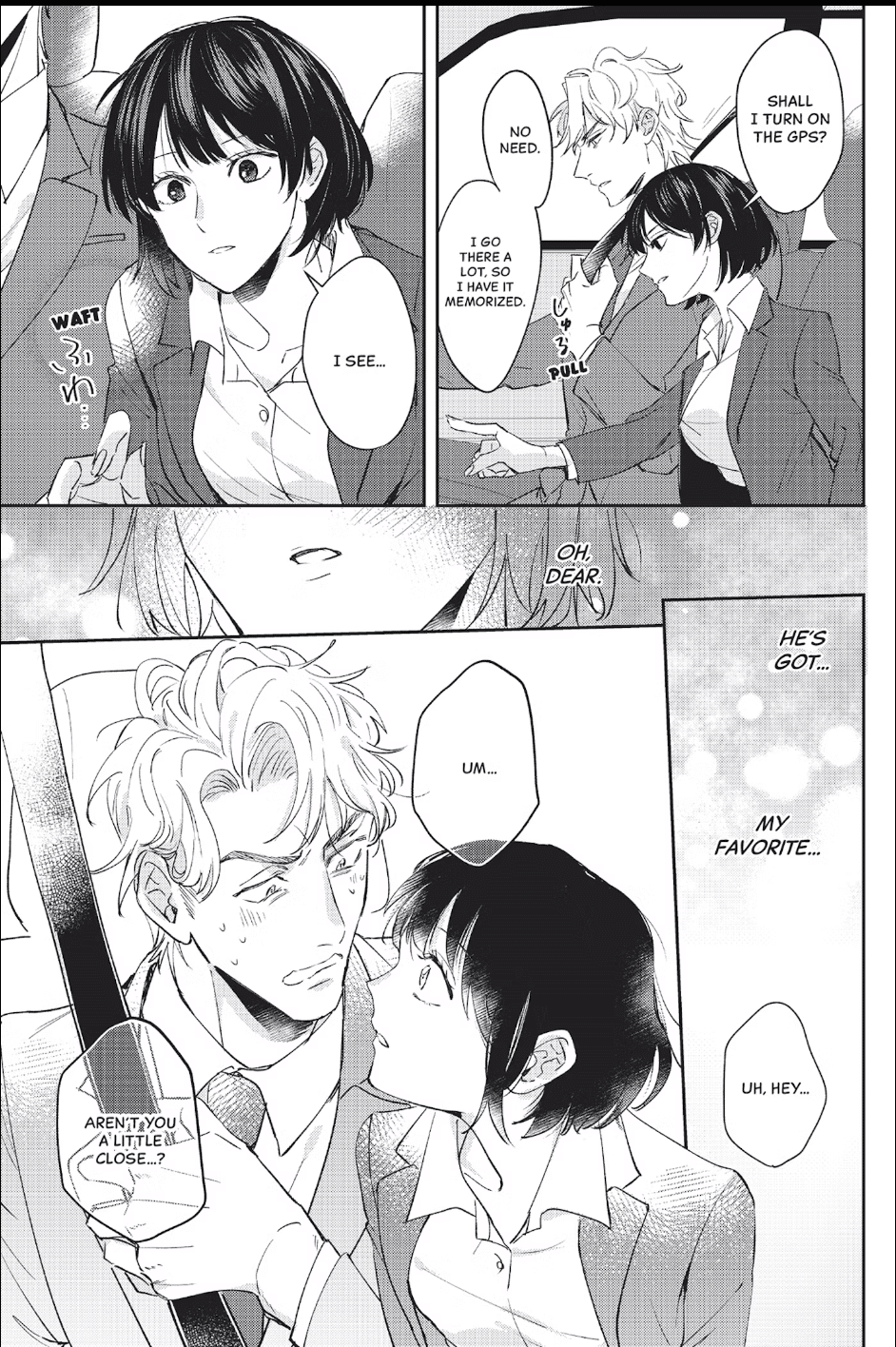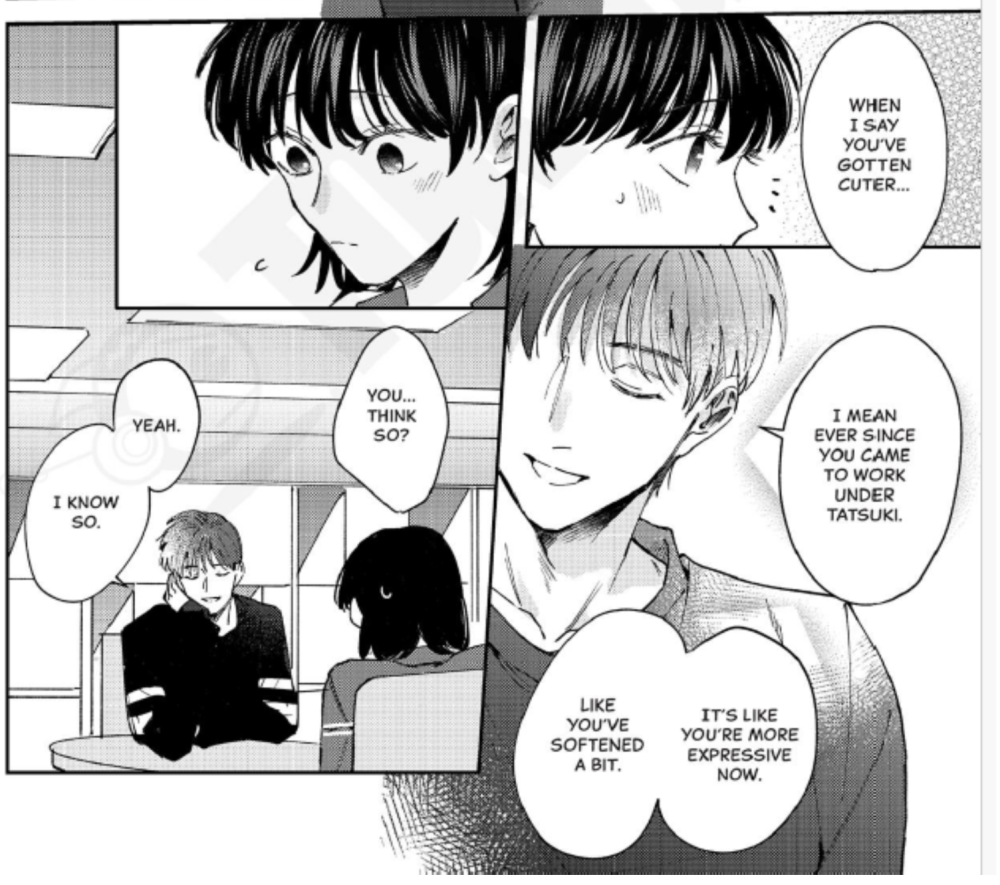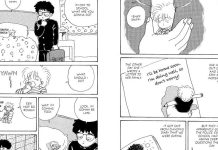
We Can’t Do Plain Love Vol. 1 – 2
Writer/Artist: Mafuyu Fukita
Translator: Renta! & Christine Dashiell
Lettering: Vibrraant Publishing Studio
Publisher: Love x Love / TokyoPop (print/digital)
Age Rating: Mature (ages 18+)
RATING: ⭐⭐⭐⭐ 4 stars (Recommended)
It’s an interesting take on office romance if you can handle the spiciness level.
We Can’t Do Just Plain Love Vol. 1 and 2 by Mafuyu Fukita offers a grown-up romance filled with sexual tension that’s tied to both characters’ relationship-related traumas. If you can handle the spiciness, We Can’t Do Plain Love offers up complicated and sometimes kinky office romance in volume 1 that ramps up considerably in volume 2.
The female lead, Sakura, is a shy, ordinary-looking office worker who has a scent fetish. This basically means that she’s sexually attracted certain smells – and in this case, this particular fetish is triggered by her tall, stylish, and slightly standoffish supervisor, Tatsuki Kiritani.

Meanwhile, Kiritani has his own issues that aren’t obvious from his outward appearances. He’s been traumatised by a past relationship, so he’s very insecure and anxious when he’s alone with women. Through a series of circumstances, the pair find out about each other’s issues, and Sakura offers to “help” Kiritani overcome his “prejudice against women and improve his social skills.” At first, Kiritani stubbornly refuses Sakura’s offer – especially since she’s his subordinate at work, but eventually, he gives in, and they begin an unusual relationship outside of the office.
The best way to describe Kiritani is that he’s a “Christian Grey,” a type that should be familiar to fans and anti-fans of the adult romance novel/movie series 50 Shades of Gray. Similar to Grey, Kiritani is a cold, good-looking executive who has trust issues with women. He’s also very manipulative and has a considerable sexual appetite.
In case you’re not familiar with 50 Shades of Gray, the movie was an adaptation of the erotic romance novel written by E.L. James. It was widely-criticised for its unrealistic and borderline abusive depiction of the BDSM sex play between the male and female leads, Anatasia and Christian. As Anatasia’s boss, Christian outranked her in their shared professional world. He takes advantage of this power dynamic to draw her into his sexual fantasies, where he seizes control over her mind and body.
Similar to Anatasia and Christian’s romantic/professional relationship in 50 Shades of Grey, in We Can’t Do Plain Love, Kiritani is able to exploit his managerial position at work to assert power over Sakura both in and out of the bedroom. But there’s more to this office romance than just Sakura and Kiritani’s between-the-sheets encounters.
But Kiritani isn’t the only one at the office who’s romantically interested in Sakura. Hasumi is an old friend of Sakura’s who works at the same company. Unlike Kiritani, he’s a chatty and confident ikemen (handsome guy), but he hasn’t revealed to Sakura his romantic feelings for her. Hasumi wants to transform Sakura into a more confident and brighter version of herself, which he thinks will happen once they turn their friendship into something more intimate. But Hasumi notices that Sakura’s personality is changing, partly thanks to her liaisons with Kiritani, and he resents that he was not the person to have accomplished that.

Hasumi’s feelings for Sakura are apparent to Kiritani, which leads Sakura and Kiritani to argue when he tries to warn her about Hasumi’s hidden agenda (romantic feelings) for her. Sakura pushes back by implying that “his way of approaching her is way more dangerous.” Their shouting match then abruptly cuts to the two being in bed together. These transitions are intentionally abrupt so that sexual tension can be created. Once again, Kiritani is able to assert dominance over Sakura, a move from the Christian Grey playbook.
Meanwhile, Kiritani’s past relationship trauma comes back to haunt him in the present when Miu, his high school classmate/ex-girlfriend who was the source of his insecurities enters the scene. Through flashbacks, we see Kiritani as a high school student and see the roots of his anxieties about his interactions with women. This is a classic strategy in romance stories, to use the male lead character’s past to legitimise their current arrogant, cold, possessive, obsessive-compulsive, sexually intense behaviours.

However, I found this explanation for Kiritani’s personality to be lacking. The flashbacks did not convince me that being rejected by his high school crush could traumatise Kiritani deeply, such that years later, he’s unable to manage his feelings and sexual desires towards women to a debilitating degree. This is underlined by Kiritani’s more recent interactions with Miu, the source of his past relationship trauma. Instead of being anxious around her, Kiritani manages to stay cool and professional, even when she tries to manipulate him. This doesn’t quite add up. It left me feeling like I needed to see more to feel more. This feels like a missed opportunity, as side characters like Miu and Hasumi have the potential to ramp up the drama in the story, but are introduced as potential conflicts/obstacles to the main characters relationship, but are resolved relatively quickly.
As rivals / threats to their relationship fade to the background, the pair’s intimate encounters increase in intensity. Kiritani uses the encounter with Miu to open up emotionally to Sakura, but seems to do it so he can manipulate and possess her like a living doll that he can have sex with, wherever and whenever he wants.
Although Sakura and Kiritani’s relationship seems intimate, their true feelings for each other don’t always come through in how they talk to each other. There’s an unspoken tension that makes it hard for both of them to define their relationship – Are they in love? Are they just “friends with benefits” or are they two broken adults who are only together until they “fix” whatever’s keeping them from having more “normal” romantic relationships?
This type of ambiguous romantic relationships are pretty familiar territory in shoujo manga stories. Paradise Kiss, Kimi ni Todoke or Nana have similar storylines that revolve around the main characters’ uncertain relationship status. But how does this play out in We Can’t Do Plain Love beyond what happens in volume 1 and 2? You’ll have to pick up volume 3 to see what’s next for this problematic pair.
Even with numerous red flags raised in this relationship, We Can’t Do Plain Love features male and female lead characters with unusual sexual hangups. This allows for a different take on the usual “I’m having an affair with my boss” story that’s common in mature romance manga stories. The art and character designs in We Can’t Do Plain Love include slim body types, sharp facial features and occasional cute/chibi expressions that will be familiar and appealing to fans of 1990s shojo manga, while spotlighting sexy, grown-up relationships that goes beyond the usual “we kissed, the end” high school romances. If you’ve been looking for something that’s “not just plain love,” then this series might be just what you need to read next.
We Can’t Do Plain Love Vol. 1 and 2 is available for purchase on Tokyopop’s website. We Can’t Do Plain Love is also featured for digital / by-chapter purchase on Renta!








